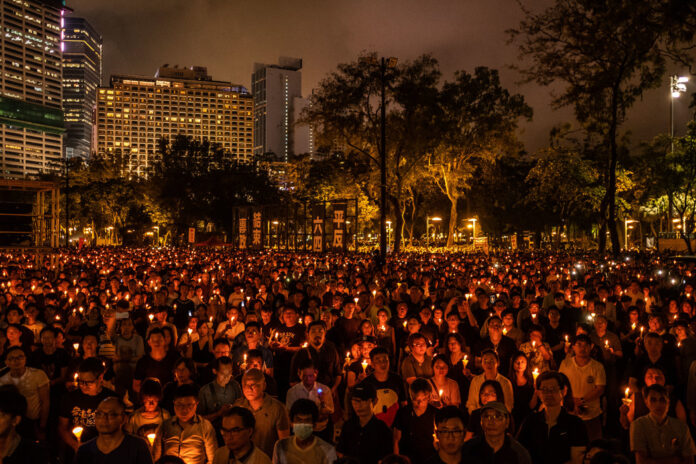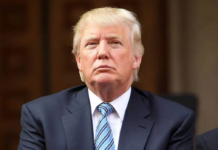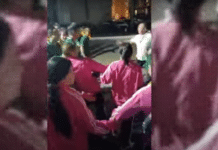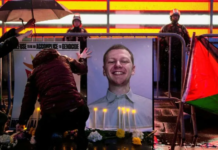Up to five years imprisonment for commemorating 1989 Beijing massacre.
Hong Liuxing and Vincent Kolo, chinaworker.info
Hong Kong’s Security Bureau have issued an official political ban on this year’s June 4 vigil commemorating the 1989 Beijing massacre, threatening up to five years imprisonment for merely attending. In addition, the police have added a last-minute charge of one year imprisonment for the simple act of publicizing the upcoming vigil.
The authorities have thereby dropped the pretence of using pandemic restrictions to justify a ban. That particular charade is over. The real reason was always the Chinese regime’s desire to exorcise the spectre of events 32 years ago, when the People’s Liberation Army used tanks and live ammunition to crush democracy protests in the Chinese capital. Extreme levels of censorship in mainland China have sought to completely erase the 1989 events from society’s memory. Hong Kong has for over three decades been the last outpost on Chinese soil, where huge and growing annual June 4 manifestations helped to keep the 1989 flame of revolt alive.
This latest round of ruthless attacks on the fundamental right to protest in Hong Kong reflects both the political insecurity felt by the Chinese dictatorship (CCP) but also its M.O. for ruling Hong Kong today. That is to continually double down on repression, with each repressive step generating an even more hardline sequel.
A month ago the Hong Kong government announced the annual vigil would be banned on health grounds. At the time, Chief Executive Carrie Lam responded evasively to questions over the legality of the June 4 vigil, saying it was a matter for the police to decide. As on so many other occasions, Lam’s view really doesn’t count for anything. Xi Jinping’s dictatorship is now running the city and its Hong Kong policies reflect overall national and global priorities rather than local factors. Lam is not in the inner circle and today she can only interpret Beijing’s body language to guess which policies she will be supporting tomorrow.
Sensing an opportunity, given the lack of a strong public reaction to the initial June 4 ban, the Chinese dictatorship demanded more. It wants to fully ban the Hong Kong vigil and establish its future illegality. From this it is also clear how much the authorities are still haunted not only by the 1989 events but also by Hong Kong’s 2019 mass struggle for democratic rights.
“Everything that’s illegal is illegal.”
Compared to last year, when the Hong Kong government banned the June 4 vigil on the grounds of Covid-19, this year’s banning (at a time with an average of one new Covid-19 case per day and the return of large-scale arts events) also included an explicitly political dimension. Regarding the vigil, Lam stated that “it much depends on what is going to happen in those gatherings and whether they will fall into the offences expressly prohibited in the national security law.” The Secretary of Labour has similarly given statements designed to cast fear in ambiguity, saying “everything that’s illegal is illegal”.
As the regime has the ability to define for itself the meanings of “subversion and secession” in the national security law, even retroactive sentences can be handed out for attending or promoting political gatherings.
When asked about the right to say popular June 4 slogans such as “end one-party rule,” Lam responded by saying, “We in the Hong Kong SAR need to respect the country’s constitution, and the constitution clearly says that socialism with Chinese characteristics is led by the Chinese Communist Party.” Compared with the prided “characteristics of respecting and advocating freedom of speech,” that Lam stated two years ago, the limitations on freedom of speech have now crept from advocating Hong Kong independence to simply calling for a different form of government.
In nearby Macau, the June 4 gathering has been explicitly banned only on the political grounds that the slogans “end one-party rule” and “stop political persecution” were “instigating subversion and defamation.” Interestingly, the laws applied were not a new national security law like in Hong Kong, but instead the reinterpretation of colonial laws from 1995.
This conclusively shows how the CCP dictatorship has reused the old apparatus of colonial oppression to suit its needs of authoritarian control. Similarly, many pro-democracy activists in Hong Kong have been imprisoned for “unlawful assembly” under another holdover of colonial law. This includes four pro-democracy activists sentenced for last year’s June 4 vigil, banned ostensibly on health grounds, with a further 20 awaiting sentencing for the same offence.
Revolutionary situation
Derided as simply a remembrance vigil, the recent bans have highlighted the Chinese regime’s sensitivity to any mention of June 4. While Hong Kong’s ‘five demands’ from the 2019 mass struggle only addressed problems in Hong Kong itself, 1989 recalls a mass revolutionary movement of students and workers which had the potential to topple the CCP dictatorship entirely. During the months leading up to the massacre, millions of workers and students in at least 300 cities across China (not just in Beijing, where the Western media was based) demonstrated, participated in civil disobedience and began to organise strike action, to call for democratization and the end of dictatorship. This quickly became a revolutionary situation, with many low-level CCP officials and members being swept along with the movement.
While students focused primarily on the demand for political democracy, the Chinese working-class also mobilized to demand an end to the explosive inequalities that had opened up under Deng Xiaoping’s pro-capitalist ‘market liberalization’. Independent unions such as the Beijing Autonomous Workers’ Federation were set up, showing the potential to overthrow the Maoist-Stalinist regime, which was rapidly moving in the direction of capitalist dictatorship, and replace this with a genuinely democratic and socialist China.
When the CCP ordered the military to crack down on the mass movement, the commander of the 38th Group Army guarding Beijing refused, reflecting a revolutionary situation that had created deep splits in the PLA and state apparatus. State power hung by a thread. A Swiss diplomat later revealed that “every member of the Politburo Standing Committee has approached him about transferring very significant amounts of money to Swiss bank accounts.” All that was lacking in the situation at that time was a clear working class alternative – a program and a leadership to carry through revolutionary change rather than one that hopes to persuade ‘enlightened’ sections of the regime to adopt ‘reforms’.
Read more ➳ Learn more about the 1989 movement
In reaction, the CCP set about to brutally massacre demonstrators in order to defeat the workers and students. As if to reflect the true counter-revolutionary class character of the CCP at that time, the vast majority killed were residents of Beijing’s outer working class districts, with the student occupiers in Tiananmen Square itself suffering far fewer fatalities. The defeat of the movement set about the decisive counter-revolutionary transition to China’s modern form of dictatorial state-guided capitalism.
Counter-revolution in Hong Kong
Now, as counter-revolutionary reaction enters full swing in Hong Kong, democratic activists are being charged with a pile of sentences as the regime seeks to consign them permanently to prison. For instance, veteran left-wing activist Leung Kwok-hung “Long Hair” has been sentenced to a combined 22 months in prison along with others for participating and “inciting” two demonstrations in 2019. Liberal youth activist Joshua Wong has also been sentenced for joining last year’s June 4 vigil, adding ten months to his year-and-a-half prison sentence. Both Leung and Wong are also charged with “subversion” under the national security law for which the maximum penalty is life imprisonment.
The sentences now being meted out in Hong Kong are more severe than during the Deng regime’s crackdown on the 1989 movement. Even the “most wanted” student leaders of the 1989 democracy movement were in most cases only given jail sentences of two to three years, while in Hong Kong now the police threaten five years just for commemorating that movement. For example, Yang Tao, head of Beijing University’s Autonomous Student Federation, received a one year sentence for “incitement to overthrow state political power” for his role in the 1989 movement. Protest leader Wang Dan was given a four year sentence.
Hong Kong’s June 4 vigils are the legacy of million strong demonstrations in solidarity with Chinese protestors in 1989, with the last legal demonstration in 2019 having attracted 180,000 people. Many mainland Chinese have continued to travel to Hong Kong to join the annual protests, defying the CCP’s dictatorial control.
Repression is not stability
The CCP now believes it can inflict a permanent ban on the June 4 vigil in Hong Kong, allowing it to remove what has long been a political thorn in its side. This will likely be followed by moves to ban the annual July 1 demonstration and other anti-government marches.
The US-China conflict is an additional powerful factor pushing the Beijing regime to go on the political offensive in Hong Kong. The sight of tens of thousands again gathering for democratic rights would be extremely negative PR for Xi Jinping in his showdown with Biden and the US president’s “democracy” crusade – in reality nothing of the sort, rather a repackaging of Trump’s anti-China agenda.
But the dictatorship is overplaying its hand. Repression will not create political or economic stability and whichever “improvements” (i.e. more totalitarian control) Beijing makes to its model for ruling Hong Kong, mass anger is growing. The previous pseudo-democracy inherited from the British colonial era, now consigned to the dustbin by the CCP, at least provided Hong Kong’s rulers with some ‘safety valves’ to release the dangerous build-up of political pressures within the system.
The bourgeois pan-democratic politicians – many now in prison – were an important part of this pseudo-democratic set up: They referenced the masses’ demands for democratic rights but always sought to reach an accommodation with the dictatorship and avoid or limit mass protests.
At the same time, China itself is today sliding deeper and deeper into crisis. Actually, it faces a multitude of interconnected crises: demographic, economic, ecological and political. Xi Jinping’s hardline repressive rule, which includes using Hong Kong as his ‘punch bag’, is creating instability in China rather than the opposite. The dictatorship is on course to detonate movements that can even put 1989 into the shade.




